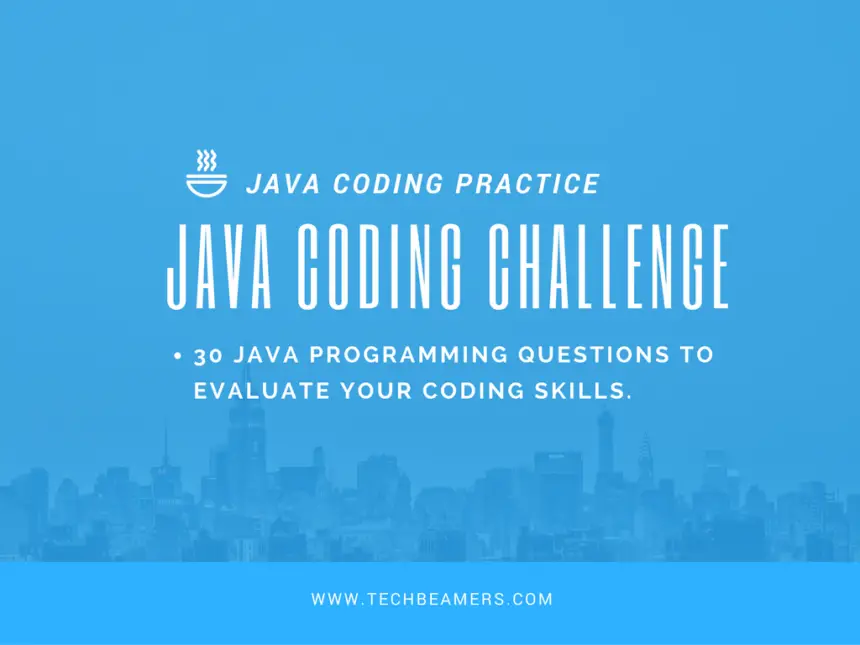Are you ready to test your Java coding skills? Here are 30 engaging Java coding questions for programmers designed to assess their programming prowess. These questions cover a range of topics, from basic data structures and algorithms to advanced object-oriented programming concepts. Let’s dive in!
Top 30 Java Coding Questions for Programmers
Programmers love to face challenges like reversing a string without using built-in functions, checking whether a string is a palindrome, and calculating the factorial of a number using recursion. Our Java coding questions for programmers will test your understanding of fundamental programming concepts and the ability to solve problems efficiently.
Head Start with Set-1 (10 Questions )
The set-1 has 10 Java coding questions. To get ready to face it, please prepare with your IDE or use any online IDE to run the given code.
Question-1. Which of the following would the below Java coding snippet return as its output?
class Super {
public int index = 1;
}
class App extends Super {
public App(int index) {
index = index;
}
public static void main(String args[]) {
App myApp = new App(10);
System.out.println(myApp.index);
}
}A. 0
B. 10
C. 1
D. Compile time error
Question-2. Which of the following combinations would the below Java coding snippet print?
class TestApp {
protected int x, y;
}
class Main {
public static void main(String args[]) {
TestApp app = new TestApp();
System.out.println(app.x + " " + app.y);
}
}A. 0 1
B. 1 0
C. 0 0
D. null null
Question-3. What would be the outcome of the below Java code?
class TestApp {
public static void main(String[] args) {
for (int index = 0; 1; index++) {
System.out.println("Welcome");
break;
}
}
}A. Welcome
B. Welcome Welcome
C. Type mismatch error
D. Run infinite-times
Question-4. What would the below Java coding snippet print?
class TestApp {
public static void main(String[] args) {
for (int index = 0; true; index++) {
System.out.println("Welcome");
break;
}
}
}A. Welcome
B. None
C. Type mismatch error
D. Run infinite times
Question-5. Which of the following values would the below Java coding snippet print in the results?
class TestApp {
int i[] = {
0
};
public static void main(String args[]) {
int i[] = {
1
};
alter(i);
System.out.println(i[0]);
}
public static void alter(int i[]) {
int j[] = {
2
};
i = j;
}
}A. 0
B. 1
C. 2
D. Compilation error
Question-6. Which of the following is the result of the following Java code?
class TestApp {
String args[] = {
"1",
"2"
};
public static void main(String args[]) {
if (args.length > 0)
System.out.println(args.length);
}
}A. The program compiles but prints nothing.
B. The program fails to compile.
C. The program compiles and prints 2.
D. The program compiles and prints 0.
Question-7. What is the result of the following Java coding snippet?
class TestApp {
public static void main() {
int odd = 1;
if (odd) {
System.out.println("odd");
} else {
System.out.println("even");
}
}
}A. odd
B. even
C. Run-time exception
D. Type mismatch error
Question-8. What would the following function yield when called?
public void test(boolean a, boolean b) {
if (a) {
System.out.println("A");
} else if (a && b) {
System.out.println("A && B");
} else {
if (!b) {
System.out.println("!B");
} else {
System.out.println("None");
}
}
}A. If a and b both are true, then the output is “A && B”.
B. If a is true and b is false, then the output is “!B”.
C. If a is false and b is true, then the output is “None”.
D. If a and b both are false, then the output is “None”.
Question-9. What would the following Java coding snippet return as its output?
class TestApp {
public static void main(String[] args) {
class Tutorial {
public String name;
public Tutorial(String tutorial) {
name = tutorial;
}
}
Object obj = new Tutorial("Java Quiz");
Tutorial tutorial = (Tutorial) obj;
System.out.println(tutorial.name);
}
}A. An exception occurs while instantiating the Tutorial class.
B. It’ll print “Java Quiz”.
C. The program will print null.
D. Compilation error at line number 13.
Question-10. What does the following Java coding snippet print?
import java.io.CharArrayReader;
import java.io.IOException;
class TestApp {
public static void main(String[] args) {
String obj = "abcdef";
int length = obj.length();
char c[] = new char[length];
obj.getChars(0, length, c, 0);
CharArrayReader io_1 = new CharArrayReader(c);
CharArrayReader io_2 = new CharArrayReader(c, 0, 3);
int i;
try {
while ((i = io_1.read()) != -1) {
System.out.print((char) i);
}
} catch (IOException e) {
e.printStackTrace();
}
}
}A. abc
B. abcd
C. abcde
D. abcdef
Set-2 of Java Coding Questions for Programmers.
Before getting ahead with the next set of Java coding questions, would you like to share your experience? If yes, please use our contact page and let us know. If you want us to come up with more resources, email us including your suggestions.
Question-11. What will be the output of the following Java coding snippet?
import java.io.CharArrayReader;
import java.io.IOException;
class TestApp {
public static void main(String[] args) {
String obj = "abcdef";
int length = obj.length();
char c[] = new char[length];
obj.getChars(0, length, c, 0);
CharArrayReader io_1 = new CharArrayReader(c);
CharArrayReader io_2 = new CharArrayReader(c, 0, 3);
int i;
try {
while ((i = io_2.read()) != -1) {
System.out.print((char) i);
}
} catch (IOException e) {
e.printStackTrace();
}
}
}A. abc
B. abcd
C. abcde
D. abcdef
Question-12. What would the following Java coding snippet return?
import java.io.CharArrayReader;
import java.io.IOException;
class TestApp {
public static void main(String[] args) {
String obj = "abcdef";
int length = obj.length();
char c[] = new char[length];
obj.getChars(0, length, c, 0);
CharArrayReader io_1 = new CharArrayReader(c);
CharArrayReader io_2 = new CharArrayReader(c, 1, 4);
int i, j;
try {
while ((i = io_1.read()) == (j = io_2.read())) {
System.out.print((char) i);
}
} catch (IOException e) {
e.printStackTrace();
}
}
}A. abc
B. abcd
C. abcde
D. abcdef
E. Nothing would get printed.
Note- Nothing would get printed. Since none of the char in the arrays matches, so the control would come out of the loop without printing anything.
Question-13. What is the outcome of the below Java code?
class TestApp {
public static void main(String args[]) {
System.out.println(test());
}
static float test() {
static float x = 0.0;
return ++x;
}
}A. 0.0
B. 1
C. 1.0
D. Compile time error
Note- The program would result in a compile error. Unlike C++, Java doesn’t support static variables declared as local. Though, a class can have static members to compute the number of function calls or other purposes.
Question-14. What does the following Java coding snippet yield?
class TestApp {
static int index = 0;
public static void main(String args[]) {
System.out.println(test());
}
int test() {
int index = 1;
return index;
}
}A. 0
B. 1
C. Run-time error at line number 6
D. Compile time error
Note- In Java, non-static methods aren’t allowed to get called from a static method. If we turn test() to static, then the program will compile without any compiler error.
When it comes to object-oriented programming (OOP) concepts, be prepared to demonstrate your knowledge of inheritance, polymorphism, and encapsulation. Our Java coding questions for programmers not only assess your technical skills but also your ability to think critically and logically. So grab your favorite IDE, and warm up your coding fingers.
Question-15. Which of the following is the result of the below Java coding snippet?
class TestApp {
public static void main(String args[]) {
int bits;
bits = -3 >> 1;
bits = bits >>> 2;
bits = bits << 1;
System.out.println(bits);
}
}A. 1
B. 7
C. -2147483646
D. 2147483646
Question-16. Which of the following is a result of the Java code given below?
class TestApp {
public static void main(String args[]) {
int index = 0;
boolean flag = true;
boolean reg1 = false, reg2;
reg2 = (flag | ((index++) == 0));
reg2 = (reg1 | ((index += 2) > 0));
System.out.println(index);
}
}A. 0
B. 1
C. 2
D. 3
Question-17. What would the following Java coding snippet display on execution?
// Command - line: java TestApp 1 2 3 4 5
class TestApp {
public static void main(String[] args) {
System.out.println(args[1] + args[2] + args[3]);
}
}A. 1 2 3
B. 123
C. 234
D. Compilation Error
Question-18. What would the below Java coding snippet print if the input given is?
// Command - line: java TestApp abcqfghqbcd
import java.io.BufferedReader;
import java.io.IOException;
import java.io.InputStreamReader;
class TestApp {
public static void main(String args[]) throws IOException {
char bit;
BufferedReader obj = new BufferedReader(new InputStreamReader(System.in));
do {
bit = (char) obj.read();
System.out.print(bit);
} while (bit != 'q');
}
}A. abcqfgh
B. abc
C. abcq
D. abcqfghq
Question-19. What would the following Java coding snippet yield on execution?
import java.io.File;
class TestApp {
public static void main(String args[]) {
File sys = new File("/java/system");
System.out.print(sys.canWrite());
System.out.print(" " + sys.canRead());
}
}A. true false
B. false true
C. true true
D. false false
Question-20. What does the following Java coding snippet print as its output?
class Cluster {}
class Node1 extends Cluster {}
class Node2 extends Cluster {}
public class TestApp {
public static void main(String[] args) {
Cluster tree = new Node1();
if (tree instanceof Node1)
System.out.println("Node1");
else if (tree instanceof Cluster)
System.out.println("Cluster");
else if (tree instanceof Node2)
System.out.println("Node2");
else
System.out.println("Unexpected");
}
}A. Cluster
B. Node1
C. Node2
D. Unexpected
Stay tuned to access the next set of 10 more Java coding questions for programmers…
10 More Java Coding Questions for Programmers
Believe it or not, only practice can make a programmer the best. Search for coding problems, and pay attention to solving them. Rethink, and rewrite better code, and you will reach a level that you wish to achieve.
Question-21. Which of the following is the result of the below program?
public class SimpleTest {
public static void stringReplace(String str) {
str = str.replace('c', 'c');
}
public static void bufferReplace(StringBuffer str) {
str.trimToSize();
}
public static void main(String args[]) {
String myString = new String("cplus");
StringBuffer myBuffer = new StringBuffer(" plus");
stringReplace(myString);
bufferReplace(myBuffer);
System.out.println(myString + myBuffer);
}
}A. cplusplus
B. plus plus
C. cplus plus
D. c plus plus
Question-22. Which of the following is the outcome of the below program? Assume the given input is <abc’def/’egh>.
import java.io.BufferedReader;
import java.io.IOException;
import java.io.InputStreamReader;
public class SimpleTest {
public static void main(String args[]) throws IOException {
char bit;
BufferedReader console = new BufferedReader(new InputStreamReader(System.in));
do {
bit = (char) console.read();
System.out.print(bit);
} while (bit != '\'');
}
}A. abc’
B. abcdef/’
C. abc’def/’egh
D. abcqfghq
Question-23. Which of the following is the result of the below Java coding snippet?
import java.io.File;
public class SimpleTest {
public static void main(String args[]) {
File sys = new File("/MVC/system");
System.out.print(sys.getParent());
System.out.print(" " + sys.isFile());
}
}A. MVC true
B. MVC false
C. \MVC false
D. \MVC true
Question-24. Which of the following would the below Java coding snippet return on execution?
public class SimpleTest {
static int test;
boolean final() {
test++;
return true;
}
public static void main(String[] args) {
test = 0;
if ((final() | final()) || final())
test++;
System.out.println(test);
}
}A. 1
B. 2
C. 3
D. Compilation error
Question-25. Which of the following values would the below Java coding snippet yield?
public class SimpleTest {
public static void main(String[] args) {
String text = "199";
try {
text = text.concat(".5");
double decimal = Double.parseDouble(text);
text = Double.toString(decimal);
int status = (int) Math.ceil(Double.valueOf(text).doubleValue());
System.out.println(status);
} catch (NumberFormatException e) {
System.out.println("Invalid number");
}
}
}A. 199
B. 199.5
C. 200
D. Invalid number
Question-26. Which of the following combinations would the below program print?
public class SimpleTest {
public static void main(String ags[]) {
String initial = "ABCDEFG", after = "";
after = initial = initial.replace('A', 'Z');
System.out.println(initial + ", " + after);
}
}A. ABCDEFG, ABCDEFG
B. ABCDEFG, ZBCDEFG
C. ZBCDEFG, ABCDEFG
D. ZBCDEFG, ZBCDEFG
Question-27. Which of the following values would the below Java coding snippet print?
public class SimpleTest {
public static void main(String args[]) {
String str = (String) returnStringAsArray()[-1 + 1 * 2];
System.out.println(str);
}
public static Object[] returnStringAsArray() {
return new String[] {
"Java",
"Quiz"
};
}
}A. Java
B. ArrayIndexOutOfBoundsException
C. Quiz
D. Compilation error
Question-28. What would the below Java coding snippet print on execution?
public class SimpleTest {
public static void main(String args[]) {
try {
args[0] = "0";
return;
} catch (Exception e) {
System.out.print("Exception");
} finally {
System.out.print("Final");
}
}
}A. Exception
B. Final
C. ExceptionFinal
D. Compilation error
Question-29. What does the following Java coding snippet print on execution?
public class SimpleTest {
public static void main(String[] args) {
int[] table = {
1,
2,
3,
4,
5
};
table[1] = (table[2 * 1] == 2 - args.length) ? table[3] : 99;
System.out.println(table[1]);
}
}A. Compilation fails.
B. 3
C. 2
D. 99
Question-30. What would be the output of the below Java coding snippet upon execution?
import java.util.Random;
public class SimpleTest {
static int count = 0;
public static void main(String[] args) throws InterruptedException {
Consumer test = new Consumer();
Producer prod1 = new Producer(test, "thread-1");
Producer prod2 = new Producer(test, "thread-2");
prod1.start();
prod2.start();
}
}
class Producer extends Thread {
Consumer test;
String message;
Producer(Consumer test, String msg) {
this.test = test;
message = msg;
}
public void run() {
Random rand = new Random();
int randomNum = rand.nextInt((1000 - 10) + 1) + 10;
System.out.println(message);
}
}
class Consumer {
private int count = 0;
public int nextCounter() {
synchronized(this) {
count++;
return count;
}
}
}A. Runtime Exception
B. thread-1 thread-2
C. thread-2 thread-1
D. Sometimes thread-2 will precede thread-1.
Conclusion
We trust that you have done a lot of Java programming practice with the help of the 30 most challenging Java questions. However, don’t leave without checking another set of 10 Java coding questions for testers.
Keep Practicing Java and Brace for a New Java Coding Challenge!
All the Best,
TechBeamers









